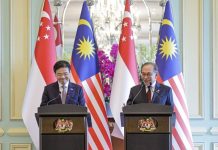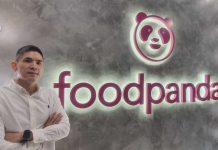Highlights:
- Sungai Tua assemblyman, Amirudin Shari new Selangor MB
- MaGIC’s Global Accelerator Programme returns for second year with 27 Global Startups
- FMM Welcomes Minister’s Statement that the Government will review the EIS
- Malaysia should tap export potential of processed foods to US
- HELPING opens up its platform to small and medium-sized enterprises in the domestic cleaning sector
- Cyber threats in Singapore grew in 2017, with SMEs especially vulnerable
Sungai Tua assemblyman, Amirudin Shari new Selangor MB
Amirudin Shari, the state assemblyman for Sungai Tua, is the new menteri besar of Selangor. He succeeds Datuk Seri Mohamed Azmin Ali who has been appointed the Minister for Economic Affairs. Amirudin took his oath of office before the Sultan of Selangor, Sultan Sharafuddin Idris Shah, at Istana Alam Shah this morning. At 38 years of age, Amirudin is the youngest to be appointed the menteri besar of Selangor after Dr Mohamad Khir Toyo of the Barisan Nasional who became the menteri besar in 2000 at the age of 35.
MaGIC’s Global Accelerator Programme returns for second year with 27 Global Startups
Malaysian Global Innovation & Creativity Centre (MaGIC) today announced that the second cohort of its signature Global Accelerator Program (GAP) was underway. 27 handpicked startups have been selected from 961 applications to participate in the programme which will help equip each with the necessary skills, knowledge, and network to become investment-ready in four months, and potentially break into the Southeast Asian market. This year, GAP has been expanded to cater to startups looking to find growth by entering new markets. With a dedicated mentorship platform offering access to both international and local mentors and exclusive access to MaGIC’s alumni network and community, GAP offers the promise of greater value creation for startups and the opportunity to build a strong network with corporates and investors. This greater focus on access to capital, through working more closely with venture capitalists and integrating them into GAP, will expose startups to more opportunities for real investment and overcome the big hurdle to growth of raising capital. Run by MaGIC, the programme provides four months of mentoring from technical and business experts; direct access to route-to-market partners such as Google, Malaysia Airlines, Maybank and Media Prima; a 6-month professional visitor pass for those not based in Malaysia; access to a co-working space; accommodation for the duration of the programme; as well as benefits worth over USD500,000 from Amazon Web Services, Canva, iPay88, EasyParcel, HubSpot, Kakitangan and others.
FMM Welcomes Minister’s Statement that the Government will review the EIS
The Federation of Malaysian Manufacturers (FMM) welcomes the Government’s move to review the Employment Insurance System (EIS). A statement posted on its website said, FMM reinforces that employers are not against introduction of the EIS but is of the view that the current model is neither balanced nor equitable. The statement added that employers and employees contributing to the EIS are also very concerned over the management of the fund. FMM maintains that the fund should be a tripartite responsibility, i.e. the Government should contribute towards the operating expenditure of managing the fund. It said FMM looks forward to the Government calling for public consultation with all stakeholders in its review exercise so that there is a better understanding of the concerns and proposals by employers on improvements to the EIS to be more transparent and efficiently managed without unnecessarily raising the regulatory burden for both employers and employees as contributors.
Malaysia should tap export potential of processed foods to US
The New York Fancy Food Show (NYFSS) from June 30-July 2 offers an interesting platform for Malaysian processed food exporters to showcase their products. But the participation of local entrepreneurs has been rather sporadic at the event. According to Muhd Shahrulmiza Zakaria, the New York-based Malaysian External Trade Corporation (MATRADE) Trade Commissioner, there will be four Malaysian exhibitors at the upcoming NYFFS 2018. Despite being a late entrant to the processed food export sector and facing fierce competition from other suppliers in the region, Malaysia can establish a niche market for this segment by aggressively tapping the export potential to the United States. The US is the world’s biggest market for processed foods in value terms and among the most open to foreign foods. In this regard, while Malaysia has already established itself as a major supplier of edible oils, the real challenge lies in increasing the exports of processed foods, and where the US is concerned, has merely ‘scratched the surface’.
HELPING enables traditional cleaning agencies to offer services online
HELPLING, a Singapore-based online marketplace for home services, has announced that it will start onboarding traditional cleaning agencies to its platform. Previously, the company collaborated mainly with self-employed or freelance cleaners. By opening up its platform to small and medium-sized enterprises in the domestic cleaning sector, Helpling positions itself as a player in the digitisation of home services and strengthens its position in the e-commerce of services. In recent years, traditional cleaning agencies have started making baby steps to digitalise their operations – e.g. by responding to customer queries through their websites. Helpling has simplified the way customers book, experience and pay for home cleaning services. Partnering with traditional and experienced cleaning agencies which invest in training of their workers will also contribute to Helpling’s commitment to customer experience and the service quality. Helpling was founded in early 2014 by Benedikt Franke and Philip Huffmann.
Helpling currently offers its services in nine countries: Australia, Germany, Italy, France, Ireland, UK, UAE, the Netherlands and Singapore.
Cyber threats in Singapore grew in 2017, with SMEs especially vulnerable
The Cyber Security Agency of Singapore (CSA) today released its “Singapore Cyber Landscape 2017” publication, which highlights facts and figures on cyber threats that Singapore faced in 2017, as well as the need to build up cyber resilience. In 2017, cyber threats continued to grow in frequency and impact. Notably, there was a shift from profit-motivated attacks towards those aimed at causing massive disruptions, such as the WannaCry ransomware campaign. According to the report, common cyber threats such as phishing, website defacements, and malware infections also showed no signs of abating in 2017. Many defacements were part of global mass defacement campaigns. The defaced websites belonged mostly to Small and Medium Enterprises (SMEs) from a range of sectors such as manufacturing, retail, and Information and Communications Technology (ICT). Phishing emails are one of the simplest and most effective methods that hackers use to steal sensitive personal data (e.g. passwords, contact information, credit card details), by tricking users into opening dubious links or attachments. Threats to Businesses. Businesses are common targets of cyber-attacks. SMEs are especially vulnerable, as they often lack the resources or know-how to adopt appropriate cybersecurity practices. Almost 40 per cent of the 146 cases reported to SingCERT in 2017 involved businesses, particularly SMEs, and most of the cases involved phishing attacks and ransomware.
























